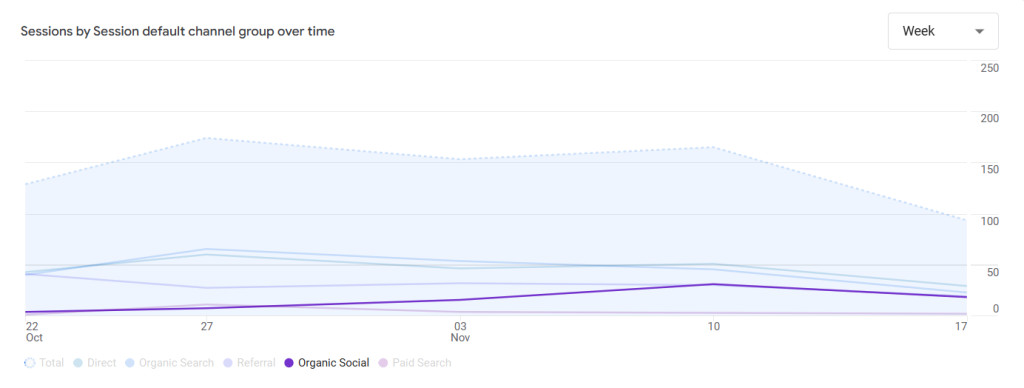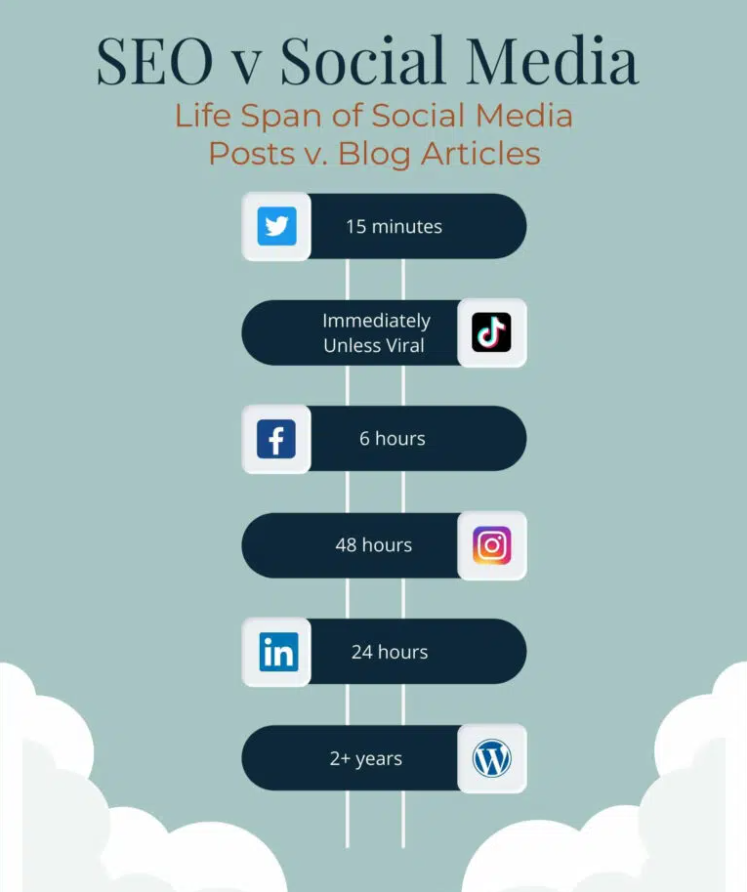The Role of Social Media in SEO
Search engine optimization (SEO) is key to any effective digital marketing plan. With over 3.5 billion searches happening on Google every day, businesses must optimize their websites to improve their rankings on SERPs.
However, SEO alone is not enough for digital success. Social media and SEO are the key ingredients for success. Social Media SEO is one of the most important strategies for boosting a brand’s online presence and improving search engine rankings.
SEO focuses on content, backlinks, and website technical details. Whereas, social media plays a key role in SEO. It helps promote content, engage audiences, and increase brand visibility. Working with a top SEO agency in Abu Dhabi can help you use both SEO and social media effectively for the best results.
How Does Social Media Impact SEO?
Social media’s influence on SEO is undeniable. It’s not just about getting more likes or followers but also about how social media platforms can improve your overall SEO strategy. Social media signals—such as likes, shares, comments, and follower count—are not Google’s direct ranking factors. Still, social media plays a crucial role in driving organic search results. Here are ways on how social media can boost your SEO efforts:
1. Content Promotion
Content promotion is a key way social media affects SEO. When you share content from your website on social media, it becomes more visible. More shares, comments, and interactions lead to more visitors to your site. This increased traffic can show search engines that your content is valuable. The more your content is shared, the more likely it is to get indexed, increasing its chances of ranking higher in SERPs. Content promotion also helps in the following:
Greater Reach:
The bigger your audience, the greater the chances of potential clicks and interactions. This can be achieved by sharing blog posts, articles, videos, and infographics.
Drive Traffic:
Social media channels are excellent platforms for driving traffic to your website. The more traffic you receive, the more likely search engines recognise your website as authoritative. This can positively impact your SEO rankings.
2. Audience Engagement
Engagement on social media is another essential element in improving SEO. The more engaged your audience is with your content, the more likely it is to spread and gain traction. When users interact with your posts, it signals to search engines that your content is relevant and engaging. You can achieve audience engagement through two main categories:
User-Generated Content:
Audience engagement can also lead to user-generated content (UGC), such as comments, mentions, and shares. UGC can improve the trustworthiness and credibility of your brand. This has a positive impact on influencing search engine rankings.
Influencer Collaborations:
By working with influencers, you can tap into their audience base, increasing brand awareness and engagement. This increased engagement and reach can indirectly benefit your SEO performance.
3. Brand Visibility and Trust
Brand visibility is a crucial factor for both social media and SEO. When your content is consistently shared across social media platforms, it enhances your brand’s visibility and establishes your brand as an authority in your industry. Brand visibility also helps build trust with both your audience and search engines. Let’s have a look at how brand visibility can impact SEO:
Reputation Management:
Social media allows you to manage your brand’s reputation by engaging with your audience and addressing any concerns or questions. A positive reputation can encourage more interactions and increase trust, which can be reflected in better SEO performance.
Brand Mentions:
When people talk about your brand on social media, even without direct links, it can have an indirect effect on SEO. Search engines monitor social signals, and frequent mentions of your brand can improve its credibility and visibility in search rankings.
4. Social Signals and Search Engine Rankings
While social media signals (likes, shares, and comments) don’t directly impact rankings, they are often used by search engines as indicators of content relevance and quality. Search engines use social signals to determine which pages are popular and which content is trending. This can influence the content that ranks higher in SERPs. Here’s how social signals affect search engine rankings:
Search Engine Crawling:
When your content is shared on social media, it may get crawled by search engine bots, allowing it to appear in search results more quickly.
Increased Backlinks:
Social media can also help generate backlinks, which are crucial for SEO. If your content is valuable and engaging, it’s more likely to be linked to authoritative websites, improving your domain authority and boosting your SEO ranking.
5. Monitor Social Signals and Analytics
Use social media analytics tools to track engagement, shares, and clicks. By monitoring the performance of your posts, you can determine which types of content resonate most with your audience and refine your strategy accordingly. Tools like Google Analytics can also help you measure the impact of social traffic on your overall SEO performance.


Lifespan of a Social Media Post vs. Blog Post
The lifespan of a social media post and a blog post differs significantly in terms of visibility, engagement, and long-term relevance.
Social Media Post Lifespan:
The lifespan of a social media post is typically brief, often lasting a few hours to a day. Posts on platforms like Twitter, Facebook, or Instagram are quickly buried by new content as the feed refreshes, meaning their visibility constantly changes. Engagement rises shortly after posting and quickly diminishes as users scroll past newer content. However, social media posts may gain long-term traction if they go viral or are shared multiple times.
Blog Post Lifespan:
A blog post, on the other hand, has a much longer lifespan. Blog content can continue to attract visitors for months or even years after publication, especially if it’s well-optimized for search engines (SEO). Once indexed, blog posts can appear in search results whenever users query relevant topics. With consistent promotion or updates, blog posts can maintain or even increase their visibility over time, making them a more sustainable content asset.
In essence, social media posts provide immediate impact but with short-term engagement, while blog posts offer long-term visibility and a lasting return on investment through organic search traffic.
Social Media vs SEO – Which One Should You Focus on First?
When deciding whether to focus on Social Media or SEO (Search Engine Optimization) first, it depends on your business goals, timeline, and the type of content you’re creating. Both are important, but they serve different purposes and yield different results.
When to Focus on Social Media?
1. You need quick visibility and engagement:
Social media platforms offer immediate exposure to a wide audience. Posts can go viral quickly, giving you rapid visibility and the ability to engage with users in real-time. If you’re looking to generate awareness or boost brand recognition right away, social media can deliver faster results.
2. Your goal is to build a community or drive instant traffic:
Social media is ideal for creating a direct connection with your audience, fostering a community, and driving immediate traffic to your website or other content. If your goal is to engage and interact with users, social media is the best place to start.
3. You want to run campaigns or promotions:
If you’re planning to launch a product, service, or event and want to create buzz around it quickly, social media offers tools like paid ads, sponsored posts, and influencer collaborations to boost exposure in a short amount of time.
When to Focus on Social Media:
1. You aim for long-term, sustainable growth
SEO takes time, but the results are longer-lasting. Optimizing your website for search engines can help it rank higher on Google and other search engines, which means that once your site starts receiving organic traffic, it can continue to do so with minimal ongoing effort.
2. You want to increase website traffic organically:
SEO is essential for improving your website’s search rankings. By targeting the right keywords, creating quality content, and optimizing for mobile and user experience, your content can appear in search results, driving continuous, free traffic to your website.
3. You’re looking to establish authority in your niche:
SEO can help you build credibility and trust over time. Quality content optimized for SEO can position your site as an authoritative resource in your field. When users find your content valuable and informative through search engines, you build brand recognition and loyalty over the long term.
The Winning Approach: Combining Social Media and SEO
Ultimately, the most effective strategy is to integrate both Social Media and SEO. Social media can drive instant traffic to your site while also helping you build brand recognition and engagement. Meanwhile, SEO ensures your website remains a long-term traffic source, with content that can be discovered organically for years to come. Working with an expert SEO agency ensures your SEO strategy is tailored to your goals, while social media efforts can support and amplify this. Using both channels in tandem maximises visibility and engagement, ensuring both short-term and long-term success.
Conclusion: The Power of Social Media in SEO
Using Social Media SEO in your digital marketing strategy is now a must for success. Social media helps promote content, engage your audience, and boost brand visibility, all of which can improve your search engine rankings.
By creating content that people want to share, interacting with your audience, and promoting your brand on social platforms, you can improve your SEO and drive more traffic to your website. If you want to make the most of Social Media SEO, working with a social media marketing agency can help you create a strong plan and grow your online presence.
Remember, SEO and social media work best when used together. The right strategy can lead to success in both your SEO rankings and overall digital marketing.

